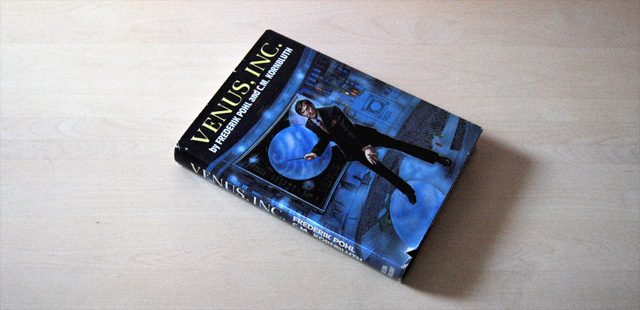
When published, the concept of extremely far reaching advertising probably seemed like science fiction, but reading this now for the first time in 2017, it doesn’t feel so far off.
Venus, Inc. is actually two books featuring Frederic Pohl’s classic science fiction novel; The Space Merchants and its satirical sequel; The Merchant’s War by C. M. Kornbluth.
The two books seem to belong together in this hardcover tome. They are two sides to the same coin. Not that they couldn’t be separate entities, but they work so well together.
First we follow Mitchell Courtenay and next we follow Tennison Tarb. Although both are challenged with circumstances beyond their wildest dreams, they are perfect characters in their imperfections.

Built into all of this, beyond the powers of advertising, is a class system as well. The whole thing is very interesting, especially considering that it was first published in 1952.
The premise of the first book The Space Merchants is simple enough. One advertising agency, Fowler Schocken has received the Venus account, which is what you expect, the account that will send humans to Venus for colonization. There is another agency Taunton Associates that is upset that they didn’t get the Venus account and lastly there are the “Consies.” Conservationists that believe all of the advertising agencies are ruining the planet.
As much as The Space Merchants is about advertising agencies ruining the planet, The Merchant’s War is about ruining two; as Venus is successfully colonized in between the two books.
Where Courtenay is the foil for some things in the first book, Tarb is the foil in the second; as both books are written from their perspectives.
In the world of both stories, business is business and for those at the top, control is the name of the game. Sound familiar? We aren’t yet beholden to advertising as established in these pages, but as I stated earlier, it doesn’t seem all that far off for a sci fi book. Although the colonization of Venus helps the reader remember that this is in fact fiction and we do still have more free will.

Can I categorically say this is a book for everyone? Probably not, but I would suggest if you have any interest based upon any of my prior comments that you do seek out this book. Give it a chance, because there is more than just a hint of truth, which makes both of these quality pieces of satire.
Exhibit A; Tarb explains what makes for a good consumer? “What made for a good consumer was boredom. Reading was discouraged, homes were no joy to be in–what else did they have to do with their lives but consume?”
Exhibit B; what about fault? “When you come right down to it, I guess nothing is ever anybody’s fault, or anyway nobody ever thinks it is. You have to do what you have to do.”
Exhibit C; and the words that are used to sell products and ideas? “…it isn’t what a slogan says that matters, it’s what people can read into it that somehow touches the subconscious.”
Read the Secret File of technical information and quotes from Venus, Inc.